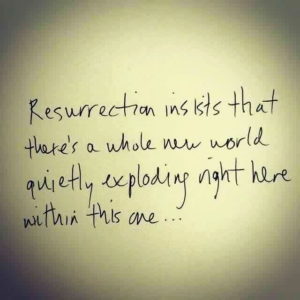Come to the Waters
Lesson Nine

River of Life—Hope
Scripture: Revelation 21–22
 I begin this final blog with a confession. For most of my life, I avoided the book of Revelation. I didn’t consciously plan to ignore this last book of the Bible, but by not opening it, by not reading it, and by not studying it with others, that is what I did. I simply ignored it. And now it is with sweaty palms and a humble heart that I offer these words on what, for me, has been a challenging book. As I begin, the voices in my head, the ones that ask, “Who the heck do you think you are to write on ANY text, let alone words from the book of Revelation?” are chattering away, growing louder and louder, just waiting to pounce. I know from experience that if I attempt to keep them quiet, they will only grow stronger and my head and hands will be paralyzed. So, I’m inviting them to stay, since that which I resist only grows stronger. I’ll keep my heart and head open and start typing, beginning with a prayer that “the words of my mouth and the meditation of my heart” will be acceptable in God’s sight.
I begin this final blog with a confession. For most of my life, I avoided the book of Revelation. I didn’t consciously plan to ignore this last book of the Bible, but by not opening it, by not reading it, and by not studying it with others, that is what I did. I simply ignored it. And now it is with sweaty palms and a humble heart that I offer these words on what, for me, has been a challenging book. As I begin, the voices in my head, the ones that ask, “Who the heck do you think you are to write on ANY text, let alone words from the book of Revelation?” are chattering away, growing louder and louder, just waiting to pounce. I know from experience that if I attempt to keep them quiet, they will only grow stronger and my head and hands will be paralyzed. So, I’m inviting them to stay, since that which I resist only grows stronger. I’ll keep my heart and head open and start typing, beginning with a prayer that “the words of my mouth and the meditation of my heart” will be acceptable in God’s sight.
Through the years, I’ve heard a variety of interpretations of the book of Revelation, most of them painting a grim and violent picture of “end times,” where some would be swept up into a beautiful heaven while others would be left behind to suffer in a nightmarish hell for all of eternity. While these fear-driven images didn’t seem to fit with the message of love and hope of the rest of the Bible, especially as expressed in the life of Jesus Christ, by not studying the words of this final book for myself, with people and resources I trusted, I was choosing to live in the dark, ill-equipped to offer an alternative interpretation. As the Harvey Cox poster from my college dorm room and in my office at church today still reminds me, “Not to decide is to decide.” But that changed in 2010, when something happened that helped me decide to take the plunge into the waters and actually open this last book of the Bible.
That year, the Presbyterian Women/Horizons Bible Study was Journeys Through Revelation: Apocalyptic Hope for Today. The study was written by Barbara R. Rossing, with suggestions for leaders by Louise Lawson Johnson. Both women did a beautiful job of opening up a book that had brought fear and trepidation to many of us. They encouraged us to put aside our preconceptions about Revelation and to listen to the overarching messages of journey, praise, and hope found within these twenty-two chapters. By giving six guiding principles to keep readers from getting bogged down, they helped me/us move from intimidation of to an appreciation and love for this important story of God’s new creation. Our circle of women opened each monthly study by prayerfully remembering these guiding principles (Journeys Through Revelation, p.4):
- Always keep in mind the historical context. We must remember that when we read Revelation, we actually are reading someone else’s mail.
- Recognize that a range of possible interpretations of Revelation are in play, but that it’s not “anything goes.”
- Take the opportunity to look beyond the literal approach. Read with hearts of poetry, art, music, and prayer. Revelation is not intended to be taken literally, but is to be read at a deeper “sign” level. Images in Revelation are windows into a vision; they are not equations or code.
- Embrace the message of hope instead of fear. God already reigns. This book was not written to terrify people but to wake them up, to encourage them, and to sustain their hope when things seemed the most bleak. Hope is the most important message of Revelation.
- Read Revelation in community. This book was written to be read out loud, in public. We read and understand Revelation not alone, but in community with others.
- Explore the sense of urgency for God’s realm. While Revelation is about the future, most of all it teaches about faithfulness in the present. It gives us eyes to see God’s vision of hope—the “New Jerusalem”—breaking into our world even now. Revelation expects communities of Jesus’ followers to live transformed lives now, here on earth—not just in the future or in heaven.
And that year, when I followed the above principles and prayerfully read what I saw and not just what I had feared, and explored the lessons in a community of women, my eyes were opened and my life changed. I also realized that I had been listening to, and later singing, words of hope and comfort from this mysterious book since I was a little girl, from the hymn “Holy, Holy, Holy” (from Revelation 4:8), Handel’s Messiah (Revelation 5:12, “Worthy is the lamb that was slain…” Revelation 11:15, “The kingdom of our world has become the kingdom of our Lord, and of his Messiah/Christ, and he will reign forever” and Revelation 19:6, “Hallelujah!”), to the anthem “E’en So Lord Jesus” by Paul and Ruth Manz, with its words coming from John’s vision (Revelation 1:4; 4:8; 12:12; and 22:5).
And now once again, through our final lesson of the 2015–16 PW/Horizons Bible Study, our author, Judy Fletcher, has opened up and further expanded our understanding of Revelation with her scholarship and her thought-filled and faithful interpretation. Among other insights, on page 74, she points to one sign of hope and joy in Revelation 21:3, encouraging us to “take note of the ‘s’ at the end of the word peoples, which indicates that all people, not just a chosen people, are included in the New Jerusalem. All are invited to live in community with God and each other…” She reminds us that while there are gates to the new creation, the gates are always open. What a powerful image! Gates that never close but are open to all!
Some final thoughts on the subject, now that the voices in my head have calmed down: The book of Revelation is a message of hope for the age to come AND it is also a call to be present to this moment. Years ago, I saw a bumper sticker that caught my attention and shifted my thinking. The sticker read “Eternal life begins today.” While the idea of living in the loving presence of God forever and ever, partnering in some beautiful new creation that we cannot even imagine, brings me hope, let’s listen for God’s call to be who we are created to be now! This is not “to earn my way into heaven” thinking. After all, all the gates are always open. As Rob Bell writes in his book, Love Wins, “A proper view of heaven leads not to escape from the world, but to full engagement with it, all with the anticipation of a coming day when things are on earth as they currently are in heaven.” Another Rob Bell quote that I find exhilarating is posted below. Let these words sink in for a little while.
It has been a privilege to be part of this 2015–16 study and I thank God for the invitation to do so. I’m closing with a benediction, a good word, which I learned in a workshop at the 1991 Peacemaking Conference at Montreat, North Carolina. Judy and David Fletcher led the event that August, so it seems appropriate to close this blog post and our year together with these words. I’ve used this benediction for almost twenty-five years with every class or workshop that I have led—including the adult Sunday morning class I currently facilitate. The words are printed on the classroom wall for visitors, but regular participants know them by heart. Each Sunday morning, we stand, circle up, and hold hands before we leave the space. I share them with you, and invite you to join hands and say the words as we leave this virtual space that I’ve come to love.
And now, let us go forth to live our hopes and not our fears,
knowing we are held in holy hands by a love that will not let us go.
In the name of the Creator, Redeemer, Sustainer,
Amen.
With Love and a Grateful Heart…
Jo Ann Currie
Director of Christian Education & Spiritual Formation
First Presbyterian Church, Pasadena, Texas
P.S. If you are interested in past PW/Horizons Bible study resources, including blogs, search Presbyterian Women/Horizons Bible study archives. There is a wealth of information and inspiration from previous years right at our fingertips! Thanks be to God.
